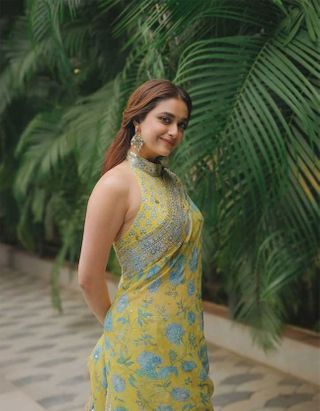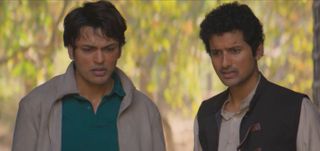
Delhi-6 Movie Review
So simple from above and yet so lusciously layered beneath, "Delhi-6" does what its director's last work "Rang De Basanti" did so spectacularly. It pushes the boundaries of cinematic entertainment almost beyond the brink, but catches its breath just in time in an exhilarating exhalation of enchanting thoughts, images and characters that seem to convey the truth about life without obstructing the truth about cinema.
Abhishek Bachchan jumps from one building top to another in the congested colony of old Delhi, as the monkey-man shows up in "Delhi-6", a mix that's zingy and intoxicating without trying to be either.
The most cherishable quality of this film, which tries to portray the cultural fabric and its tragic-comic resonances in a society trapped between the machinations of religion and politics, is its transparency.
Even when Rakeysh Omprakash Mehra makes deep comments on the culture and politics of religion in contemporary India, he keeps his narrative liberated of punctuation marks.
The narrative flows in one seamless harmony of characterizations, music and satire bound by a vision that sees the aspirations of an "Indian Idol" contestant (Sonam Kapoor) in the same line of vision as the sexcapades of a wily local photographer and the self-serving pontifications of a Hindu right-wing woman.
The greatest virtue of "Delhi-6" is its bustling mass of everyday commuters from Chandni Chowk, whose lives converge in routine and not-so-routine ways to create a work of art that pays a heartwarming homage to the spirit of a city without romanticizing the gali (bylane) culture of towns where jalebis are fried by streetside vendors next to kids defecating in open sewers.
As a society based on hierarchical and communal segregation collapses all around us, Mehra portrays this society in a flux with a mixture of pleasure and regret without getting overly nostalgic.
There are lines which openly ridicule the 'dilli ke dilwale' who are supposed to be one big happy family. However, the family here - warring brothers Om Puri and Pavan Malhotra - and religious communities fall apart with a heartbreaking thud.
The dynamics of a culturally-decaying society are projected into scenes that come together as vibrant vignettes drawn with sincerity, affection and transparency from the most endearing colours of life.
Binod Pradhan's cinematography is the real hero of "Delhi-6". He captures the faded pastels of the crowded gallis of Delhi and the aesthetic garishness of the Ram Leela with the feeling and fervour of a subtle celebration rather than a flamboyant festival.
Mehra's film completely avoids the touristic cliches that the theme - NRI boy returns to desi roots with dying grandma - could have happily embraced. By the time the narrative reaches a sombre climax, we're watching a work of art that transcends the power of the visual medium, sneaks into the realm of dark poetry and then re-merges as a socio-political commentary.
Abhishek, who plays a half Hindu-half Muslim NRI returning to his roots in Delhi, essays his role with elan.
It would be unimaginable to think of "Delhi-6" without the huge cast of players. The cast is so much into the subtle, satirical and profound spirit of the film that you wonder which came first, the characters or the actors.
It would be grossly unfair to single out any of the performances. But mention must be made of Deepak Dobriyal as the innocuous Muslim jalebi seller who's pushed against the communal wall, Pavan Malhotra as a loud somewhat mean electrician, Divya Dutta as the locality's garbage collector, Vijay Raaz as the neighbourhood sadistic cop and Atul Kulkarni as the naﶥ punching bag.
Waheeda Rehman is so serene yet spirited as the dying grandma, somewhat representative of the world that she comes to inhabit in Delhi with her grandson. But the film belongs to Abhishek Bachchan.
"Delhi-6" is swarming with metaphors, some of them poetic. Peeling off layers of texts and subtexts, we arrive at a work that exudes the scent of true lived-in and experienced emotions.
The hurt and anger of a socio-political system that has gone from corruptibility to destruction is hidden just beneath a warm, sunny all-is-well veneer so beautifully represented by Sonam Kapoor dancing with the dove perched on her head.
What an idea!
OTHER REVIEWS



















